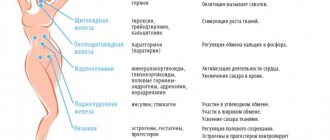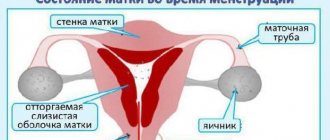Many girls perceive menstruation as an official reason not to train. However, as it turned out, critical days are not a reason to completely abandon fitness. What rules need to be followed “on these” days for a successful workout - read in our material.
Rating: 4.5 out of 5 based on 2 votes
The menstrual cycle is a natural physiological process that is not a disease. To be honest, periods are not a reason to give up fitness. Moreover, American sports doctors are confident that it is during menstruation that the female body can endure the heaviest loads, since the level of estrogen and progesterone in the body drops, metabolism accelerates and endurance increases.
Of course, there are girls who feel pain during menstruation - this, of course, is a reason to refuse training. But if you do not experience any discomfort, you can continue the training process. The main thing is to follow simple rules.
Sports during critical days
- Recommended. It is possible to exercise during your period. In some cases, exercise is even beneficial, especially for those who have severe pain during menstruation. Pain during menstruation is caused by spasms of the uterus, which, by contracting, tries to remove the exfoliated endometrium. Like any muscle, it can be relaxed with the help of special exercises that produce the effect of stretching the contracted muscle layer (slow bending back, shallow slow squats with stretching while standing on your toes up, etc.).
- Prohibited. Active sports during menstruation are absolutely contraindicated, because... increase blood flow to the female pelvic organs, can cause bleeding, loss of consciousness, dizziness, exhaustion of the body, weakened by menstrual blood loss. You cannot run fast, do strength exercises, aerobics, swim in a pool or ponds (this is not hygienic and can lead to infections in the blood and genitals of a woman). During menstruation, any serious stress on the body is prohibited. Active sports before and during discharge can lead to delays.
- Allowed. It is permissible to play sports during menstruation by reducing the load to a minimum: warming up the limbs (swinging your arms, turning your neck), leisurely walking, yoga without twisting (with the goal of only warming up the joints and muscles, without exercises on the lower body). The body should not be exhausted, tired, or overexerted - here it is better to focus on your feelings: as long as the workouts are comfortable, you are allowed to exercise, but if you experience the slightest physical discomfort, you should stop them immediately.
Does the menstrual cycle affect athletic performance?
Does the menstrual cycle affect athletic performance? It is believed that sport preserves youth. While the body is at its peak in physical fitness during adolescence, for women it coincides with the onset of menstruation. In the past, the impact of the menstrual cycle on athletic performance has been underreported, with others downplaying its impact.
What symptoms does menstruation cause? First, a quick summary of what the menstrual cycle involves. A woman’s body undergoes preparation every month for a possible pregnancy. The egg is released from the ovary and the lining of the uterus thickens (luteal phase). If the egg is not fertilized before the end of the cycle, the lining of the uterus is shed.
Along with these changes, women experience premenstrual syndrome (PMS), which manifests itself in emotional, behavioral and physical symptoms. About 85% of women experience at least one sign of PMS before their period.
These symptoms can disrupt the training of female athletes. Women begin to experience physical symptoms such as joint and muscle pain, headaches, weight gain and low energy levels. Emotional and behavioral symptoms caused by PMS also affect physical activity. These include insomnia, poor concentration, irritability and changes in appetite.
Experts now believe that changes in levels of the hormones and neurotransmitters serotonin may play a role in the development of symptoms.
There is also a severe form of PMS known as premenstrual dysphoric disorder, which causes symptoms such as panic, despair, binge eating and lack of interest in daily activities.
But to what extent do menstruation and associated symptoms affect women's ability to participate in sporting activities? It is well known that for some women, PMS symptoms can be severe enough to require missing work, and they can impair a woman's ability to exercise. However, regular exercise is often recommended to relieve PMS symptoms. Does this mean that female athletes are protected from this condition?
Physiologist Jason Karp believes that fluctuations in the hormones progesterone and estrogen lead to physiological changes in the body during menstruation, and these changes are exacerbated by exercise - especially if it is intense.
Changes in the body during the luteal phase of the menstrual cycle also increase breathing and body temperature.
"High body temperature during the luteal phase makes it difficult to work in the heat because you don't start sweating until you reach a higher body temperature," explains Karp.
Increased breathing during the luteal phase means that less oxygen is available to the muscles involved in the exercise.
Dr Susan White from Australia says: “The fact that some women associate symptoms such as fatigue, bloating or general sluggishness with their menstrual cycle is difficult to measure. And even if we could measure them, it's hard to say they would affect performance."
Paula Radcliffe was able to set a world record while on her period. For Andu Bobby George from India, menstruation prevented her from achieving success.
“I was in great shape, but this period made me feel weaker and there was nothing I could do,” she said. “After the performance, many people criticized my performance, but I couldn’t tell anyone anything.”
In India, menstruation is considered even more of a taboo than in the UK and US. Some consider menstrual blood unclean, some girls are not allowed to enter the kitchen or sleep on mattresses during this period, and an estimated 10% of girls consider menstruation to be a disease.
Some teams, such as the British Olympic hockey team, monitor their players' menstrual cycles.
“We don’t want to take any risks,” the coach said. “If you reach the finals of the Olympics, you have to control every aspect of your work.”
Some athletes take birth control pills and injections to control their menstrual cycle or stop it completely. However, many medications affect water retention, and some contain prohibited ingredients.
Read more in the media:
Menstrual cycle 'last taboo' for women in sport
What exercises can you do when you're on your period?
To maintain muscle tone and slightly reduce pain during menstruation, use this set of exercises:
- "Wave". Lie on the floor with your back down. Stretch your arms along your body. Bend your knees so that your feet touch the floor. Relax your abdominal muscles. Breathe not so much with your chest as with your stomach; with deep, tangible breaths, it should expand. Do the exercise for two minutes, during which time do slow, smooth bends up and down with your lower torso.
- "Extension." Stand up straight. Stretch your arms up and stretch as high as possible. Rise onto your toes and stretch again. Do this on your fingers for 10 steps.
- "Cat pose." Get on all fours with your elbows and knees on the floor. Lower your head to the floor, touching your forehead to the space between your elbows. You can tilt your pelvis slightly back. Relax your abdominal muscles as much as possible. Stay there for as long as you want - there is no time limit.
- "Downward Facing Dog Pose." Stand so that your feet and palms are on the floor, your arms and legs are extended, your pelvis is at the top, exactly in the middle. You should end up with a triangle. Tilt your pelvis back a little, stretch your arms, relax your abdominal muscles as much as possible. Stand for no more than 1 minute; you don’t need to do it too often.
- "Snake Pose" Lie on your stomach. Stretch your legs along the floor. Raise your torso vertically, perpendicular to the surface, your arms should be extended along the torso and your palms should be on the floor, your pubic bone should lie on the floor. Slowly, lightly pull the muscles of the abdomen and rib area upward, towards the chest. You can bend your legs at the knees and lift them perpendicular to the floor (“the snake raises its tail”) and again slightly pull the muscles on the ribs towards the chest. Do this only on pleasant sensations, as the body “asks”. You can calmly stay in this pose, without pulling your abdominal muscles away from the pelvic area.
- "Wall". Stand next to a wall, turn your side to it. Place your hand from elbow to palm on the wall. And without changing the position of your legs, slowly bend your side so that your thigh touches the wall, and just as slowly return to your previous position. Repeat the procedure 3 times, then change sides.
There are a large number of yoga exercises that you can do during your period. They will relieve pain, maintain muscle tone, have a beneficial effect on the functioning of the whole body, and give results even with low loads. How to perform such exercises, how long to do them, what poses are contraindicated on menstruation days, learn from this video:
Yoga practice during menstruation: what is good and what is bad. How to cope with pain, etc.
When is it possible
Not all sports during menstrual bleeding are contraindicated. According to doctors, if you approach the issue of physical activity wisely and do not overload yourself with grueling workouts, the negative impact on your well-being these days can be avoided.
There are specific sports that, on the contrary, are recommended for women. For example, doing fitness and light running during menstruation is very useful, as this type of physical activity strengthens muscle tone and normalizes blood flow. However, if you feel unwell, you will have to refuse it.
Also, on critical days, women are recommended to stretch. Do some stretching the day before your period begins, and you will notice that the intensity of pain by this period will decrease significantly.
If you are afraid of gaining weight during your period, you can do yoga. Static exercises help maintain good shape and strengthen muscles.
Also, to improve your well-being during menstruation, it is recommended to do Pilates, dance, swim, run, etc. The main thing is not to overwork yourself.
To prevent your health from deteriorating due to sports training on critical days, you need to adhere to these recommendations:
- Any physical exercise with weights should be completely excluded. A healthy woman can play sports according to a standard program, but without increasing the load.
- If you experience mild discomfort in the lower abdomen, it is recommended to choose a gentle training regimen. The number of repetitions of all exercises should be reduced.
- Strength training should be avoided. They should be replaced with yoga or Pilates.
Exercises that are contraindicated
- torso turns, twisting exercises;
- lifting weights (dumbbells and other weights);
- exercise on exercise machines in the gym (all of them put stress on the legs, abs, or are based on pulling weights with your hands);
- do high-intensity bends;
- do a birch, raise the pelvis too high, take “inverted” poses;
- put stress on the lower back.
Things to remember:
- due to excessive training, there may indeed be a delay in menstruation;
- Exhausting workouts and diets are stress for the body, which disrupts hormonal levels;
- if the delay is 2-3 days, then there is no reason to worry, the body simply adapts to the new loads. But you need to see a doctor if you haven’t had your period for more than 10 days and you feel unwell;
- in order to minimize the likelihood of delays, you need to include fats and vitamins in your diet;
- During your period, take a break from working out or just do yoga.
Do you experience lag during intense exercise?
Often, when a woman suddenly changes her lifestyle, starts going to the gym, stays late at work and much more, the body moves to another level. Menstrual cycle disruptions can be serious. At this moment, do not put off going to the gynecologist. You should consult your doctor and take measures to normalize the general condition of the body.
If you become nervous about the condition, it will make it worse. It is better to take a break and wait until your periods become normal. And then, at a slow pace, start all over again so that the body gets used to strong physical and emotional stress.











